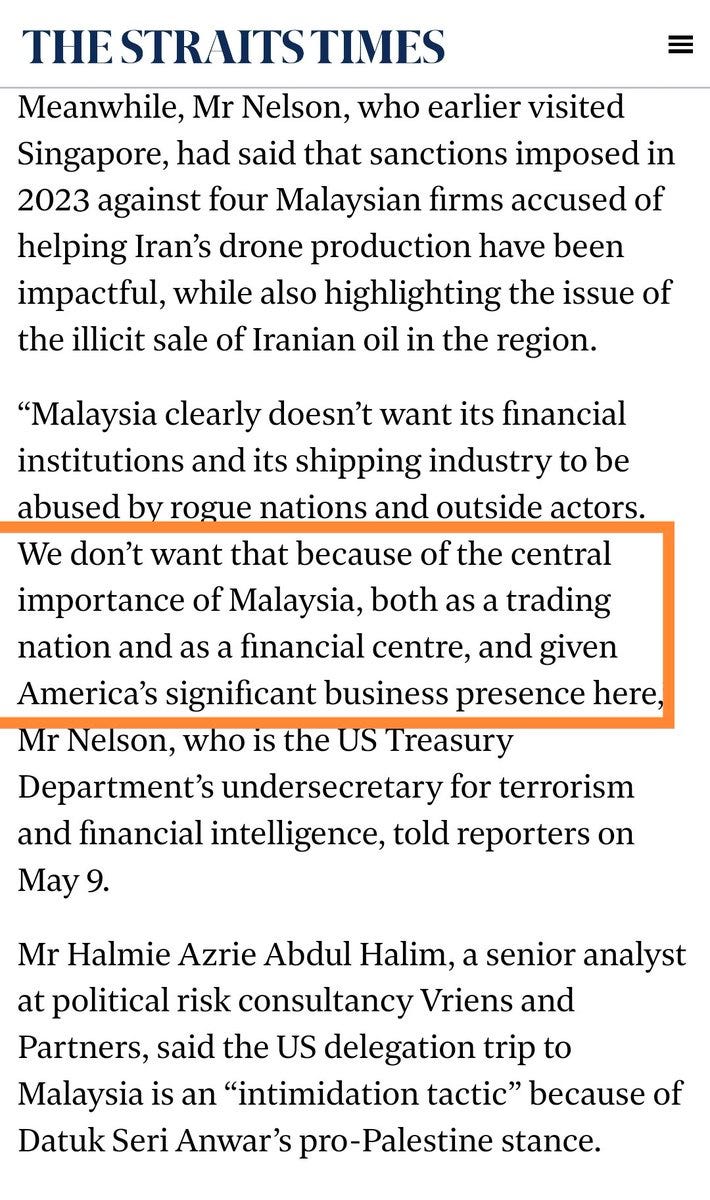OK, so now we’re at war with Malaysia? Of course, that depends on what you mean by war, but when the owner of the world reserve currency starts deploying sanctions against you, the person on the sanctioned end could be forgiven for thinking they’re in a war. After all, subjugating another previously sovereign nation, forcing it to submit to US defined rules rather than to internationally recognized norms (laws), amounts to depriving that nation of its sovereignty. War by whatever means.
Here’s how it works. The US is at war with Iran, who supplies oil to China—with whom we’re also at war, because both these countries don’t accept US rules. Malaysia is caught in between, playing a middleman role.
The US Treasury Dept's top sanctions official arrives in Malaysia: "Nice little trading nation and financial centre you have there. It would be a shame if something happened to it."
Quote
Amena Bakr @Amena__Bakr
Malaysia will not recognize US sanctions aimed at curtailing Iranian oil flows to China.
Mr Halmie Azrie Abdul Halim thinks the US is trying to “intimidate” Malaysia, because of Malaysia’s outspoken support for Palestine. He may be right, given that the Iran - China oil trade is a long standing relationship. On the other hand, maybe it has to do with the recent escalation of the US war on China. That’s the thing about the US-makes-the-rules global order—the US can be very flexible when it chooses to be:
So much for sanctioning Russia, right?
The Straits Times article linked in the tweet above is quite informative regarding how sanctions replace actual diplomacy in the rules based order. No doubt there is a carrot and stick approach, but the stick is the real point. Note that the US also has Singapore in its sights. This is a global quest for hegemony, a claim to police the entire world economy for the interests of the American Empire with the dollar as reserve currency the big club:
KUALA LUMPUR – Malaysia will recognise sanctions imposed by the United Nations only and not by individual countries, said Home Minister Saifuddin Nasution Ismail on May 9, following claims by a top US official that Iran has relied on Malaysian service providers to sell US-sanctioned oil in the region.
“I emphasised that we will only recognise sanctions if they are imposed by the United Nations Security Council.
“The delegation from the US respected our stance,” Datuk Seri Saifuddin told reporters following a meeting with the US Treasury Department’s top sanctions official Brian Nelson, who was visiting Kuala Lumpur.
Washington has imposed sanctions on Iran and its proxies, including on the sale of Iranian oil, aimed at choking money flows that it claimed were being used to foment instability in the Middle East.
Mr Nelson, speaking to the local media after the meeting, said of the Washington claims against Malaysian service providers: “I would only say we have seen and we’ve promulgated some sort of guidance to the (Malaysian) marine sector about the type of services that they are engaging in.
…
Malaysian Prime Minister Anwar Ibrahim has been vocal in his support for Hamas amid the ongoing war in Gaza, even at the risk of US sanctions against those who support the group that Washington has deemed a terrorist organisation.
Meanwhile, Mr Nelson, who earlier visited Singapore, had said that sanctions imposed in 2023 against four Malaysian firms accused of helping Iran’s drone production have been impactful, while also highlighting the issue of the illicit sale of Iranian oil in the region.
“Malaysia clearly doesn’t want its financial institutions and its shipping industry to be abused by rogue nations and outside actors. We don’t want that because of the central importance of Malaysia, both as a trading nation and as a financial centre, and given America’s significant business presence here,” Mr Nelson, who is the US Treasury Department’s undersecretary for terrorism and financial intelligence, told reporters on May 9.
Mr Halmie Azrie Abdul Halim, a senior analyst at political risk consultancy Vriens and Partners, said the US delegation trip to Malaysia is an “intimidation tactic” because of Datuk Seri Anwar’s pro-Palestine stance.
Still, the “US would also not want to lose the support of Malaysia, which is one of its key Asean partners, as the country will assume the role of Asean chair next year”, he said.
Malaysia is among the US’ top 20 trading partners, with bilateral trade between the two nations amounting to US$78.3 billion (S$106 billion) in 2022.
Of course the US is within its rights to refuse to do business with whatever country it chooses, but this will inevitably lead to resentment and the move to circumvent US domination. BRICS is the obviousl alternative. The move away from the dollar will only increase in momentum as the US sanction regime becomes more oppressive to more and more countries. This will inevitably harm what have previously been regarded as important US strategic interests (think ASEAN), as the US juggling act tries to keep too many balls in the air at the same time.





Maybe these people are just stupid after all.
I doubt Singapore will toe the US line much longer if the latter continues to act in such rogue fashion as it increasingly has of late. A substantial chunk of SG's revenue comes from stamp tax on megadeals (and the presence of the global institutional giants who generate them) that are primarily drawn to the country by its stable/predictable legal system and rule-of-law culture (yes, there's always been some corruption at the pinnacle of power there, but it's already priced-in). Too much to lose in going along with an unreliable partner.